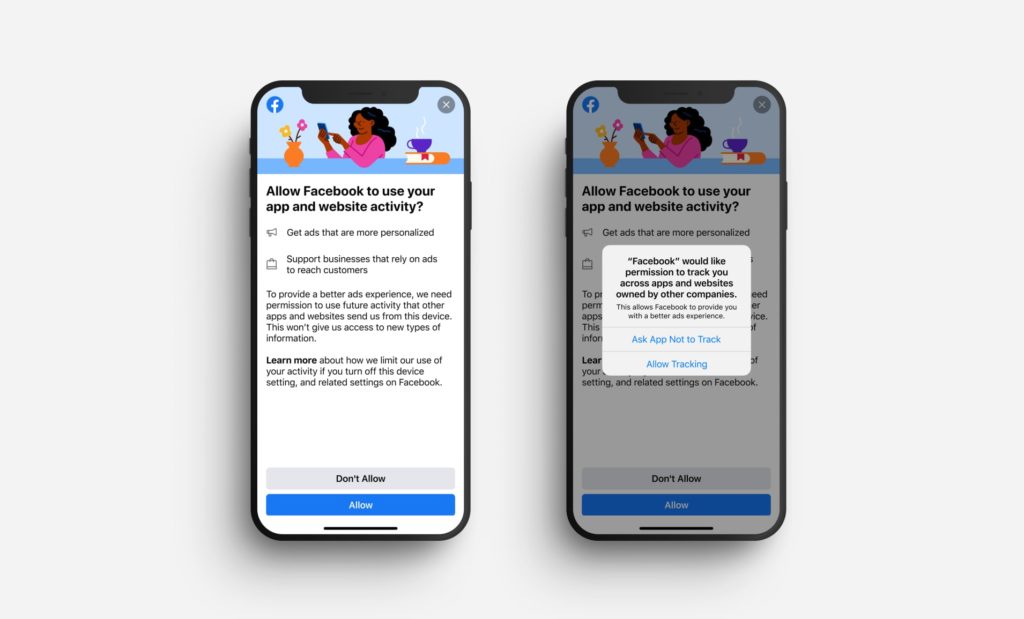Yet another policy is being implemented across Facebook for advertisers everywhere. With the rapid and exponential growth of digital advertising and data tracking, Facebook has been taking strides over the years to cater its platforms towards both consumers and businesses. Now, with Apple’s iOS 14 Update, which shines a light on App Tracking Transparency, Facebook is forced to adapt its platforms to new standards—standards that extensively alter the way ads are served, tracked, and engaged with.
What is the iOS 14 Update?
So what exactly does Apple’s new iOS 14 policy entail? Simply put, it allows for user transparency in regard to app tracking. All apps will be required to submit information on how their app collects and utilizes consumer data. In addition to this, they will need to display a prompt that asks users for permission to track their data across third-party apps and websites. This prompt will both show users what information is being tracked and give them the opportunity to opt-out. It is likely that this will encourage users to decline tracking, which will severely limit advertising capabilities, on Facebook specifically.
We believe users should have the choice over the data that is being collected about them and how it’s used. Facebook can continue to track users across apps and websites as before, App Tracking Transparency in iOS 14 will just require that they ask for your permission first. pic.twitter.com/UnnAONZ61I
— Tim Cook (@tim_cook) December 17, 2020
Where Does Facebook Stand On This Update?
Ever since Apple announced the iOS 14 update back in June of 2020, Facebook has been against these changes and, especially, the impact it will have on smaller businesses. As the update will be rolling out during Q1 of 2021, however, Facebook will be adhering to these guidelines and has already provided advertisers with webinars and resources about how they are handling these changes, which includes:
Implementing a Required Prompt
As mentioned above, apps will be required to display prompts where users will need to allow or decline the tracking of their data. Facebook is not excluded from this and has already begun implementing a prompt across its platforms.
Continuing to Collect Data
For the individuals who opt-in to the transparency prompt, device identifiers will continue to be collected.
App-Based Business Tools
Facebook has enabled its SDK to support Apple’s SKAN API and will support app-based business tools for Apple’s SKAN API for mobile apps moving forward.
Aggregated Event Management (AEM)
For those who develop and optimize ads through web-based business tools, Facebook is limiting the measurement of certain events for iOS 14 users through the Aggregated Event Management (AEM) system. This will ultimately change the way that advertisers track their conversions.

Changes Web Advertisers Can Expect
The aftermath of this update will be felt by both web and app advertisers. For an in-depth guide on how ads will be changing for both advertisers, we recommend reading this guide from Facebook. However, here, we will be reviewing some general limitations businesses need to be aware of as they continue to promote on Facebook’s family of apps.
Creating Ads
The biggest ad limitation that will be seen for web advertisers is that reach and frequency bidding will no longer be available. Auction bidding will be the only available buying option when making ads for iOS 14 devices.
Reporting
The new iOS 14 update will limit advertisers’ ability to measure the performance of campaigns because:
- Real-time reporting will not be supported.
- Data may be delayed for up to 3 days.
- Support delivery and action breakdowns (age, gender, region, etc.) will no longer be supported.
- Attribution windows will change to a seven-day click, one-day view window and set at the ad set level.
Targeting
For targeting, audiences will begin to decrease as people start to opt-out of tracking, which means audiences may need to be broadened to reach more potential customers. Facebook advertisers who utilize standard and custom events will also be maxed out at 8 conversion events per domain.
Actions Moving Forward
To prepare for these incoming changes, Facebook recommends that advertisers complete the following steps:
- Verify your website’s domain to help avoid any future disruption of your website campaigns. This should be prioritized for domains with pixels used by several businesses/personal ad accounts.
- In Events Manager, configure 8 preferred web conversion events per domain.
- Prepare for the shift in attribution windows and adjust your campaign strategies accordingly.
With social media continuing to be a force in digital marketing, changes are inevitable. As with any technological change in this industry, all advertisers can do is adapt and use their creativity and innovation to propel forward.
Social Media Advertising at Today’s Business
Our Social Media Strategy team takes a comprehensive approach to social media marketing with your business goals in mind. Our methods are anything but one size fits all. We formulate a unique and competitive strategy for each brand that we work with. Depending on your goals, we are able to determine appropriate KPIs for each of your campaigns. We are constantly keeping up to date on emerging trends in the social landscape to ensure that our campaigns are always utilizing best practices and performing adjacent to industry standards. If you are ready to start embracing the full potential of Facebook and Instagram advertising in your brand’s social media campaigns, let’s talk!




.svg)